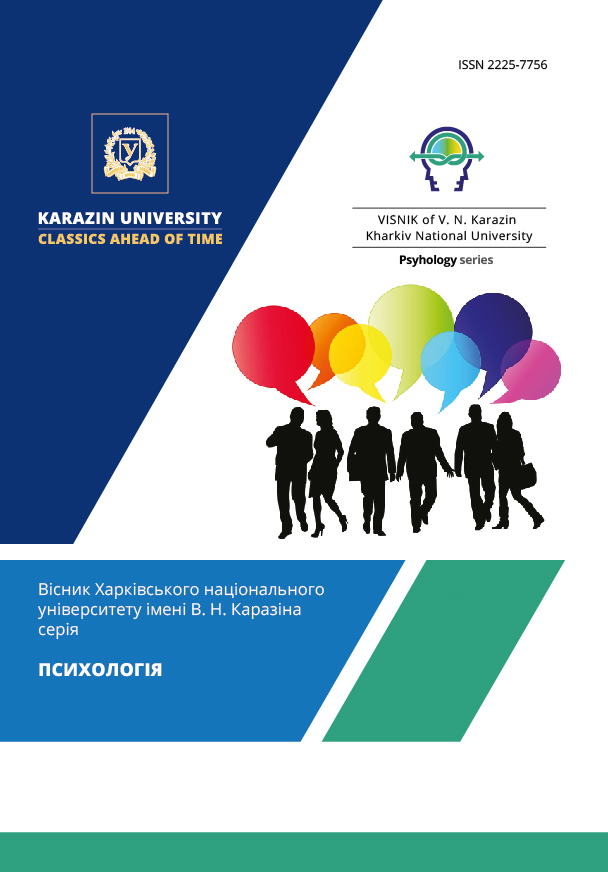THE RELATIONSHIP BETWEEN THE ATTITUDE OF LAW ENFORCEMENT OFFICERS AND CIVILIANS TO LIES WITH THE SUCCESS OF ITS RECOGNITION
Abstract
The article is devoted to the description of attitude to lies and success of its detection in groups of civil recipients and police. Results of two empirical studies are presented in the article. At the first study (n = 120) was found that civil recipients are better in deception detection if they have epistemological understanding of concept of lie. Those recipients who understand the lie from a moral position, condemn it – are worse in lie detection. Those recipients who considers the main motive of lies is «to create a good effect» are also successful in deception detection. Perhaps this motive is projection, and people who have this motive are more attentive to the communicant, spend more effort to recognize verbal and non-verbal cues. The comparison group of recipients who rely on scientifically confirmed and unconfirmed cues of deception was shown, that scientifically confirmed group is better in lie detection.
In a group of civil recipients it was shown that attitudes to different types of lies are correlated. It was also found that the better a person evaluates himself as a successful liar, the more often he uses lie in life and the more positive attitude to lies. However, the attitude to different types of lies is not correlated with the success of detection lie, truth and messages (lie+rtuth) - only with self-esteem as a successful or unsuccessful recipient.
In the second study (n = 62) it was found that lie detection in police is not correlated with age, work experience, attitude to white lies. The police, in general, are more aware of the cues of lie, more often civilians rely on scientifically confirmed, in particular, verbal cues. However focus on scientifically confirmed cues of lie is associated with prejudgment in police. The main motive of lies «to create a good effect» named by the
police improves lie detection, like in civil group. But understanding lie as ontological or moral position is not associated with lie detection in police.
In general, both groups detect lies at the level of random guessing (50%), which is consistent with other studies. Differences in success in detection of messages (lie+rtuth) are due to bias. Biases, probably, are more associated with attitude to lie.
Downloads
References
Белановская О. Особенности представления студентов о лжи / О. Белановская. Лингвокультурное образование в системе вузовской подготовки специалистов: сб. научных трудов / под ред. В. Ф. Сатиновой. Брест, 2017. С. 164–171. URL: http://www.brsu.by/sites/default/files/foreignlang/25.11.2016-brsu.pdf
Васюк К. М. Особливості переживання емоцій на різних етапах аналізу неправдивої інформації. Педагогіка і психологія. Острог, 2013. № 13. С. 10–15. URL: https://psj.oa.edu.ua/collections/n22-2013
Граница А. С., Кислицына А.В. Изучение связи между отношением ко лжи студентов медицинского университета и их способностью определять ложь. Практическая медицина. Казань, 2015. № 5. С. 74–78. URL: https://www.elibrary.ru/item.asp?id=25079562
Гулевич О. А. Роль профессионального опыта в распознавании лжи. Вопросы психологии. Москва, 2011. № 6. С. 57–66.
Демидченков О. Л. Особенности психологии распознавания лжи в деятельности сотрудника патрульно-постовой службы / О. Л. Демидченков. Морально-психологическое обеспечение оперативно-служебной деятельности сотрудников госавтоинспекции : сб. материалов ведомств. служб. 2016. С. 54–57.
Знаков В. В. Классификация психологических признаков истинных и неистинных сообщений в коммуникативных ситуациях. Психологический журнал. Москва, 1999. № 2. С. 54–65.
Истомина К. В. Способы распознавания и преодоления лжи в процессе дознания или следствия. Вестник Екатерининского ин-та. Москва, 2019. № 4. С. 137–140. URL: https://www.niev.ru/wp-content/uploads/2018/11/%D0%92_448_22.pdf
Симоненко С. И. Психологические основания оценки ложных и правдивих сообщений : дис. … канд. психол. н. : 19.00.05. Москва, 1998. 26 с.
Цветкова О. А. Гендерные особенности распознавания лжи. Омские социально-гуманитарные чтения : материалы XI междун. науч.-практ. конф. (г. Омск, 24–26 апреля 2018 г.). Омск, 2018. С. 299–304. URL:http://conf.ict.nsc.ru/humanities2018/ru/participationview/447209
Чухрова М. Г., Филь Т. А., Юдина С. Д. Психодинамика лжи. Актуальные направления научной мысли: проблемы и перспективы. Сб. науч.-практ. конф. (г. Новосибирск, 18–20 марта 2019 г.). Новосибирск, 2019. С. 368–378.
Швець Д. В. Формування професійної спостережливості працівників патрульної поліції через навчання профайлінгу / Швець Д. В. Підготовка поліцейських в умовах реформування системи УМВС України : зб. наук. праць (за матер. ІІI міжнар. наук.-практ. конф. м. Харків, 24 травня 2018 р.). Харків, 2018. С. 136–139. URL:http://repositsc.nuczu.edu.ua/bitstream/123456789/6991/1/%D0%97%D0%B1%D1%96%D1%80%D0%BA%D0%B0_24.05.2018-2%20%D1%81%D0%B5%D1%80600.pdf
Шкуратова И. П., Крикало Е. Л. Отношение студентов к разным видам своей и чужой лжи. Индивидуальные различия в познании и общении, Ростов-на-Дону, 2007. С. 266–284.
Экман П. Почему дети лгут? Москва: Педагогика Пресс. 1993. 272 с.
Augustine To Сonsentius, Against Lying. URL: http://www.newadvent.org/fathers/1313.htm. (дата звернення: 20.06.2020).
Bogaard, G., Meijer, Е., Vrij, А. Strong but Wrong. Lay People`s and Police Officers` Beliefs about Verbal and Nonverbal Cues to Deception. PlosOne. 2016. Vol. 11(6). DOI: doi.org/10.1371/journal.pone.0156615
Bond, C. F. Accuracy of Deception Judgments. Personality & Social Psychology Review. 2006. Vol. 10. Р. 214–234.
Ekman P. Why don’t we Catch a Liar? Social research. 1996. Vol. 65. Р. 802–817.
Hartwig, M., Bond. С. Lie Detection from Multiple Cues: A Meta-analysis. Applied Cognitive Psychology. 2014. № 28(5). https://doi.org/10.1002/acp.3052
Masip, J., Garrido, Е., Herrero, С. When did you Conclude she was Lying? The Impact of the Moment the Decision about the Sender’s Veracity is Made and the Sender’s Facial Appearance on Police Officers’ Credibility Judgments. Journal of Credibility Assessment and Witness Psychology. 2003. № 4(1), Р. 1–36.




